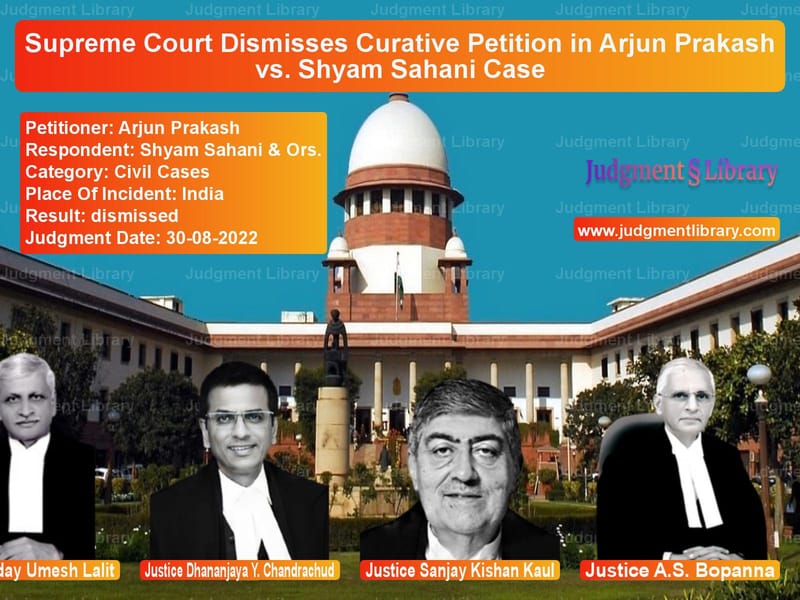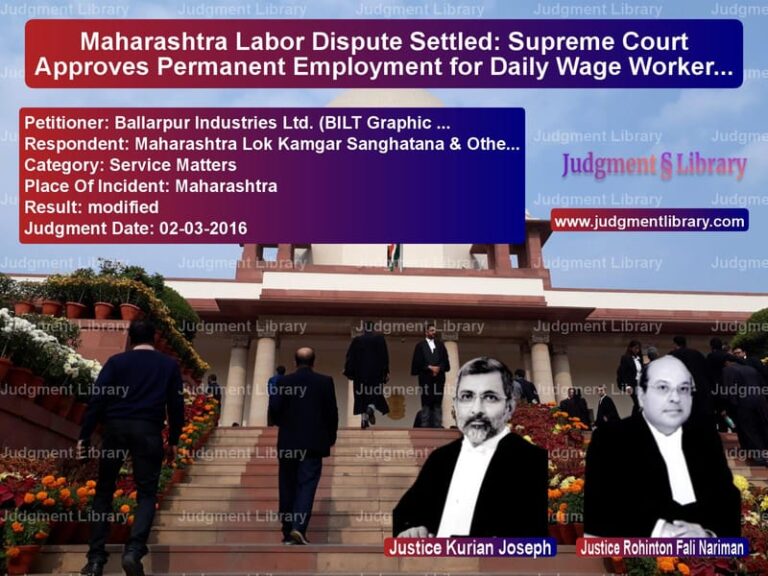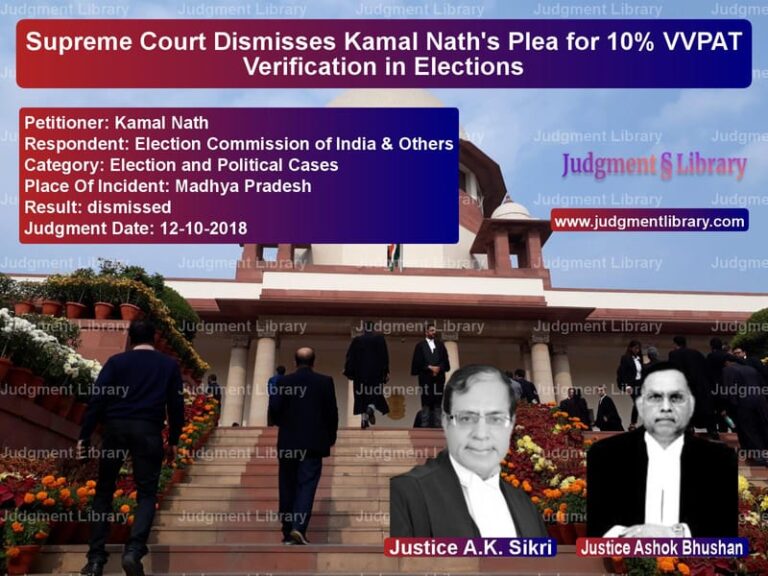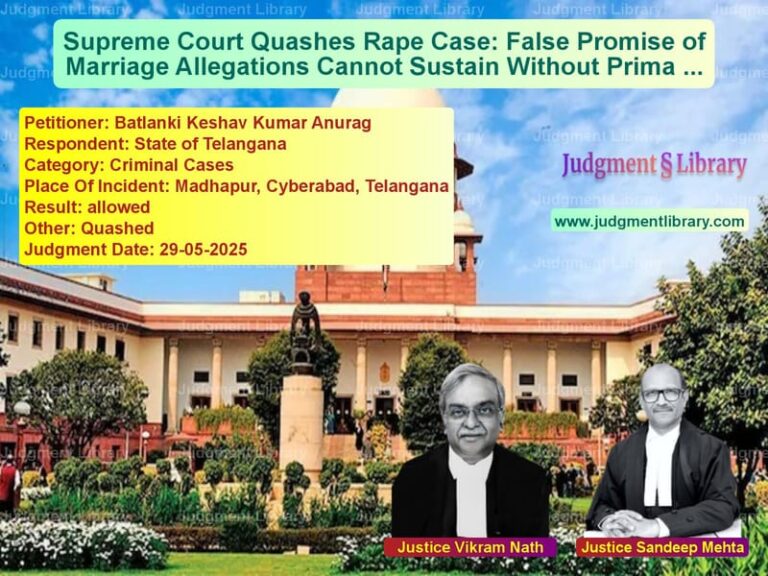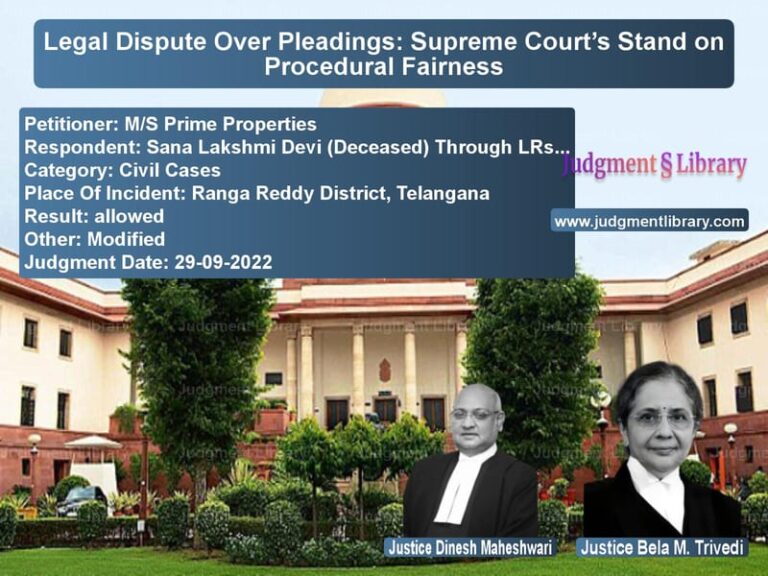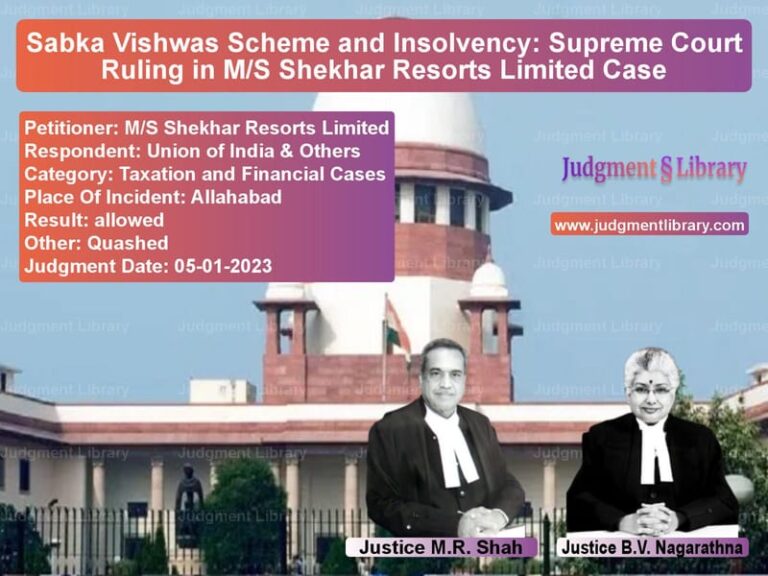Supreme Court Dismisses Curative Petition in Arjun Prakash vs. Shyam Sahani Case
The case of Arjun Prakash vs. Shyam Sahani & Ors. revolved around a curative petition challenging a previously dismissed review petition in a long-standing civil dispute. The Supreme Court of India was called upon to determine whether the curative petition met the stringent criteria established in Rupa Ashok Hurra vs. Ashok Hurra & Another, (2002) 4 SCC 388 and whether it could reconsider its final judgment.
Background of the Case
The dispute originated in a civil matter where the petitioner, Arjun Prakash, had earlier filed a civil appeal (Civil Appeal No. 2210 of 2020). The Supreme Court ruled against him, leading him to file a review petition (Review Petition No. 1837 of 2020), which was also dismissed. Seeking another opportunity to overturn the judgment, he filed Curative Petition (Civil) No. 66 of 2021.
The curative petition was filed under the inherent jurisdiction of the Supreme Court, invoking principles from the Rupa Ashok Hurra judgment. This case set the precedent for curative petitions in India, allowing for reconsideration only in cases of “gross miscarriage of justice.”
Key Legal Questions
The Supreme Court had to decide:
- Whether the curative petition met the strict parameters laid down in Rupa Ashok Hurra for reconsideration of a final judgment.
- Whether the petitioner had suffered a grave miscarriage of justice warranting curative intervention.
- Whether the principles of judicial finality should be upheld to prevent endless litigation.
Arguments Presented
Petitioner (Arjun Prakash) Arguments
- The petitioner argued that the previous judgments contained fundamental errors that had resulted in a miscarriage of justice.
- He contended that the review petition was dismissed without properly considering all material facts.
- He urged the Court to exercise its inherent jurisdiction to prevent an unjust outcome.
Respondent (Shyam Sahani & Ors.) Arguments
- The respondents contended that the case had already been adjudicated at multiple levels, and reopening it would undermine judicial finality.
- They emphasized that the curative petition did not meet the conditions outlined in Rupa Ashok Hurra and that there was no miscarriage of justice.
- They argued that allowing curative petitions in such cases would create a precedent for endless litigation.
Supreme Court’s Analysis and Judgment
The Supreme Court examined whether the petition met the stringent standards for curative relief and whether any exceptional circumstances warranted reconsideration.
Key Observations by the Supreme Court
- The Court reaffirmed that curative petitions are an extraordinary remedy meant only for cases where there has been a “gross miscarriage of justice.”
- It ruled that merely disagreeing with a judgment does not justify invoking curative jurisdiction.
- The Court found no violation of principles of natural justice or procedural irregularities in the previous judgment.
- It emphasized that judicial finality is essential to prevent unnecessary litigation.
- The Court reiterated that the petitioner had already been given ample opportunities to present their case in the appeal and review proceedings.
Key Court Statement
“We have gone through the curative petition and the relevant documents. In our opinion, no case is made out within the parameters indicated in the decision of this Court in Rupa Ashok Hurra vs. Ashok Hurra & Another, (2002) 4 SCC 388.”
Final Judgment
- The Supreme Court dismissed the curative petition.
- It reaffirmed that the review petition’s dismissal was final.
- The Court held that no further judicial review was possible in this matter.
Implications of the Judgment
This ruling has significant implications for curative petitions and the finality of Supreme Court decisions:
- It reinforces that curative jurisdiction is an exceptional remedy, not a routine appeal process.
- It ensures that judicial finality is respected, preventing abuse of the court system.
- It upholds the principle that mere disagreement with a judgment does not constitute a “gross miscarriage of justice.”
- It prevents excessive litigation by setting a high threshold for curative petitions.
- It strengthens the authority of the judiciary by ensuring that only the most exceptional cases are reconsidered.
Conclusion
The Supreme Court’s decision in this case upholds the integrity of curative petitions as a rare legal remedy. By dismissing the petition, the judgment reaffirms that curative relief is only granted in cases of grave injustice and cannot be used as a substitute for multiple appeals. The ruling sets an important precedent for future cases involving curative petitions in India.
Petitioner Name: Arjun Prakash.Respondent Name: Shyam Sahani & Ors..Judgment By: Justice Uday Umesh Lalit, Justice Dhananjaya Y. Chandrachud, Justice Sanjay Kishan Kaul, Justice A.S. Bopanna.Place Of Incident: India.Judgment Date: 30-08-2022.
Don’t miss out on the full details! Download the complete judgment in PDF format below and gain valuable insights instantly!
Download Judgment: arjun-prakash-vs-shyam-sahani-&-ors.-supreme-court-of-india-judgment-dated-30-08-2022.pdf
Directly Download Judgment: Directly download this Judgment
See all petitions in Property Disputes
See all petitions in Landlord-Tenant Disputes
See all petitions in Specific Performance
See all petitions in Judgment by Uday Umesh Lalit
See all petitions in Judgment by Dhananjaya Y Chandrachud
See all petitions in Judgment by Sanjay Kishan Kaul
See all petitions in Judgment by A. S. Bopanna
See all petitions in dismissed
See all petitions in supreme court of India judgments August 2022
See all petitions in 2022 judgments
See all posts in Civil Cases Category
See all allowed petitions in Civil Cases Category
See all Dismissed petitions in Civil Cases Category
See all partially allowed petitions in Civil Cases Category

